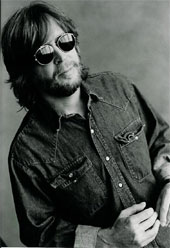 One of the most respected musicians in the Twin Cities, Bruce McCabe has been playing keyboards since the late 60's. In addition to playing with Kim Wilson prior to Wilson moving to Texas to form the Fabulous Thunderbirds, McCabe has played a key role in two legendary Twin Cities bands, Lamont Cranston and The Hoopsnakes. More recently you will have seen Bruce touring with Jonny Lang. We conducted this interview during March and April of 2002.
One of the most respected musicians in the Twin Cities, Bruce McCabe has been playing keyboards since the late 60's. In addition to playing with Kim Wilson prior to Wilson moving to Texas to form the Fabulous Thunderbirds, McCabe has played a key role in two legendary Twin Cities bands, Lamont Cranston and The Hoopsnakes. More recently you will have seen Bruce touring with Jonny Lang. We conducted this interview during March and April of 2002.
Ray: Please tell me when and where you were born and raised?
Bruce: I was born in Maquoketa, Iowa and raised in Clinton, Iowa, a town of about 35,000 people on the Mississippi.
Ray: Was piano/keyboards your first musical instrument and when did you first begin playing?
Bruce: I was pretty young when I started taking piano lessons but was equally into playing guitar from about fifth grade on. My Dad was a great singer and guitar player. He and my Uncle Jack had an act together for years when they were young in the 30's and he got out his guitar and sang a lot. He taught me chords on the ukulele when my hands were little and it was such a revelation when I later discovered the tuning was like the bottom four strings of a guitar. I probably would have been a guitar player in bands but there were just too many great guitar players so I always ended up on the piano.
Ray: What other instruments do you play?
Bruce: I play some guitar and I have a lot of old keyboard instruments. I am particularly fond of this old Estey reed organ from the 30's that my wife bought from an old woman. It was covered with dust in a barn . It's very unique, I've never seen or heard anything like it. I'd take it on the road but I'm afraid something might happen to it.
Ray: Who were some of your early keyboard and musical influences?
What types of music did you listen to when growing up?
What attracted you to the blues and who were some of the players who influenced that style of playing?
Bruce: I took classical piano until I quit in eighth grade (bad idea). My teacher for most of that time was a nun, Sister Kathleen, who was amazing. She tried to get me into twelve tone jazz and Rachmaninoff, and all kinds of things but I was more into the Beatles and all the new music that was coming out in the 60's. I liked Ray Charles already by that time but the first blues record that really got me was a James Cotton record called 'Pure Cotton' that I got for 99 cents at Woolworths. The piano player, Alberto Gianquito, remains my all time favorite. That opened the door to Otis Spann and all the great blues piano players, Lafayette Leake, Memphis Slim, on and on. I could always find blues records in the sales racks for cheap, which fit my financial condition. I wouldn't know who Junior Parker was, but at 99 cents I could afford to find out and then it was like a great discovery. My high school friends and I were into the Beatles, The Rolling Stones, Bob Dylan, Stevie Wonder, The Band and lots of other things, folk music, R&B, blues . I could never put on the blinders and be a blues purist. I like lots of different styles. I still go from Muddy Waters to Nat King Cole to Beethoven to Willy DeVille to Mahalia Jackson with the push of a button. And then always back to the Beatles.
Ray: Tell me about your band history, when you first started playing in bands and who they were? When and why did you move to the Twin Cities?
Did you hook up with Aces, Straights & Shuffles with Kim Wilson and Bob Bingham around that time? Who else was in the band and tell me about that time.
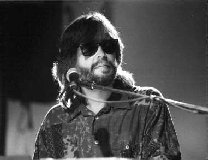
Bruce: My first band in high school in the late 60's did a lot of Rolling Stones. We had a great guitar player (still is) by the name of Ken Clark who could play just like Keith Richards. We did songs by the Beatles, The Band, Led Zeppelin, and others. That band moved up to Toronto for a while after high school and we had some wild times but it fell apart. I did a lot of hitchhiking around the country and ended up in Maryland doing cement work but I got a call from some friends to join a country rock band so I moved back to Iowa. We ended up as a house band at a little club in Alexandria, MN where I met my wife.
That fell apart and I moved back home and worked in a milk carton factory during the day and played in a band at night. I remember waking up in the dark once knowing I was late for one or the other but I wasn't sure if it was morning or night. The drummer from the country band sent me a tape of a band he was in in Minneapolis and asked if I wanted to join. The tape was great and here's why. The harp player was Kim Wilson who later got famous in the Fabulous Thunderbirds, Bob Bingham (Charlie's brother) was one of the guitar players, Kent Duchaine on bass, and the other guitar player was Luther Tucker . And guess what album I knew him from- 'Pure Cotton' That James Cotton record I loved. That was enough for me. I loaded an upright into a U- Haul trailer behind my 64 Chevy and headed for Minneapolis. It turned out it was an audition but luckily I passed. Luther Tucker had left by the time I got there so I never got to meet him. That band was called Aces, Straights, and Shuffles. My first show was at the Cabooze, a new club at the time. My time in Aces was a tremendous learning experience. All these guys knew the blues inside out. I was just starting at that really, and I didn't have a good way to mike up the piano so nobody could hear me half the time, which was probably a good thing. After a year, Jimmy Vaughan kept coming up to Minneapolis to try and get Kim to move down to Texas. Kim and I were sharing an apartment at the time and he decided to make the move. I remember I could have gone with him. Not that I had a sure thing at joining their band, but I remember weighing it out.
I basically played whatever piano was at the club. Those were still the days when most clubs had a piano, left over from the swing band era is my guess. I had played on the first Lamont Cranston album and Pat had offered me a job. I knew they'd be most apt to play clubs with good pianos and my future wife/girlfriend didn't want to go to Texas -- too far from her family. On a side note, I did haul pianos around when I had to. In those days you could get them in the want ads for free or maybe ten bucks. I left pianos in clubs around Minnesota when we were too lazy to load it back in the truck after the show. Then I'd go get another one. Anyway, I joined the Cranstons. I had times over the years to wish I'd gone to Texas after watching Kim get so successful. But now, looking back, I'm glad I stayed in Minneapolis and the time in the Cranstons I wouldn't trade for anything.
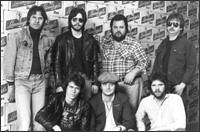
Ray: Tell me about your years and experience with the Lamont Cranston Blues Band, touring with Bonnie Raitt and other road stories as well as local shows, etc.
Got any good stories about those years you can tell me?
Bruce: Lamont Cranston was a popular band before I joined. With the recording of that first record things escalated. That wasn't a common thing to do back then, just making a record on your own, so it looked like they'd been signed to a record deal which was a level of success that bands strived for. It worked like a charm, long lines outside the Cabooze. It was a very popular band around Minnesota and then we got a '56 Scenic Cruiser bus and went around the country and had a good following in the Denver area and places on the east coast. Looking back it was expensive to take a big band like that on the road for what we were getting paid when the records weren't getting to some of those places anyway. As shaky as the business was, the music was what mattered to us in the end . Pat was a wild front man. He gave it his all every night usually to good crowds. But even If we ended up in some weird club with ten people he'd have those ten people dancing on the tables. You asked for some stories so I'll tell a few.
The tour with Bonnie Raitt was a highlight for sure, just getting to watch her show every night. I have a good memory of her and Albert Collins playing with us at one of the River Flat Jams. I remember the two of them playing acoustic guitars by the side of the bus.
Opening up for Muddy Waters at the River Serpent was a big deal to us. I wished I'd gotten autographs but I always made a point to shake hands with the great ones for good luck . I shook hands with Howlin' Wolf back in Aces. He actually introduced himself as the Tail Dragger, I'm not kidding.
We did a show in New York City at a club called The Other End when Dan Ackroyd and John Belushi got onstage with us to try out this thing called The Blues Brothers that they had yet to do on Saturday Night Live. John asked if we knew 'Hey Bartender' and I had just learned it at home. I can't remember what else we played but I remember later going to this new punk club CBGB's and watching The Cramps but ending up in the corner singing Louis Jordan songs with Jim Novak and John Belushi. We were supposed to get on SNL but got beat out by Meatloaf. We did get to go to a SNL after the show party. All these stars were around and I was in a corner just kind of watching and John Belushi came over to me and said, 'If I weren't doing what I'm doing, I'd be doing what you're doing,' meaning playing in a blues band. I felt bad when he died. He wasn't a wild man drug addict like they made him out to be. He was a really nice guy in my book. And I do seem to be writing a book.
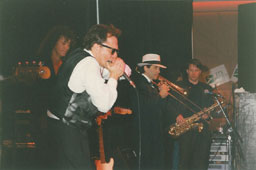
This is my favorite Cranston story. Pat called on a day off and said if we could get everybody to the airport in a couple hours we could open up for the Rolling Stones in St. Louis. There was a big snow storm that night or I doubt we would have all been at home. One of the horn players didn't make it but the rest of us did. I remember Mick Jagger coming into the dressing room and saying something along the lines of, 'If they start booing just tell 'em to go ___ themselves.' I should ask some other Cranstons if they remember it that way. It was right after Prince got a bad reaction warming up for them. For a bunch of Stones fans like us it was a big deal. We did two more shows with them in Cedar Falls and here.
Ray: You were close to Rick O'Dell weren't you, tell me about him.
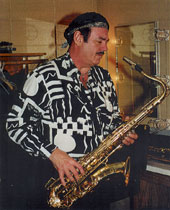
Bruce: I did feel close to Rick O'Dell. He was one of the nicest guys I ever met. I ended up rooming with him on the road. He had a great sense of humor. Everyone who knew him will attest to that. But he had a philosophical side to him as well. At night after the show back at the hotel he would go into his observations about life and people. I always enjoyed that. I remember him saying once that he thought people didn't take him seriously because he was always joking around and they'd never seen him any other way. Well, we all truly miss his jokes but the music he made, the solos he played night after night and the stuff he was recording at home that I heard, showed all those other sides. He was a deep person and a wonderful musician and very kind.
For some reason I keep picturing riding in a car with him to a gig and he was talking about how some people have to try and better any story they hear. If you say you saw a rainbow they have to say how they saw a double rainbow. By the end of his routine he was pretending to be one of those people claiming to have seen 'a triple rainbow............at night.'
At his funeral people told all kinds of examples of his wonderful sense of humor. He was just so good natured he kept you from taking things too seriously and made everyone around him feel better.
Ray: I saw you and Charlie perform with The Lamont Cranston Blues Band at Rick's tribute concert last fall, that must have been a very emotional experience for you. Please tell me about that night and the reunion.
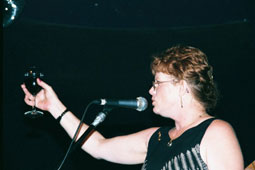
Bruce: There were emotional moments at the tribute concert for Rick. It seemed strange not having Rick there. I feel close to the Cranstons and playing those songs with those guys was what I grew up on. It felt right. Jenny, Rick's wife, got up and sang a song for him that was beautiful. I've never understood how anyone can do that. I get a lump in my throat and I couldn't imagine singing. They also played a video of Rick playing a song of mine in the Bingham McCabe Band. Whatever the film was I'd never seen it before. That one threw me. I've got to try and get a copy of that.
Ray: Tell me about the time Rick O'Dell's horn got run over by the band bus.
Bruce: It was at the Zodiac Lounge up in Moorehead. I can't remember why the horn had been set down by the bus wheels or who backed up the bus, but it was a scene out of a Laurel and Hardy movie. An expensive horn flat as a pancake. It's funny now but at the time, ouch.
Ray: When did you start writing songs and can you describe your song writing process, if you have one?
Bruce: I started writing songs in eighth grade. I wanted to be like Bob Dylan who I listened to all the time. I've often called it a neurotic habit in a way, you know, rhyming words all the time. As far as a song writing process goes, I don't really have one. Occasionally whole songs come to me rather quickly, like I'm just taking dictation from some unknown place. Others I work on like a crossword puzzle. I tend not to force anything which makes me not real prolific. Maybe it's just laziness, but then again the idea of just filling up the world with songs you don't care about just to make money doesn't interest me. I look at it as an expression of who I am, or who I wish I was, that I'm leaving behind. My Grandfather died when I was very young but the poetry and paintings he left behind always made me feel like I knew him. Lately I have made some attempts at writing with people. Some of those Nashville guys are amazing, like Michael Lund and Gary Nicholson. They truly know the craft and I'm sure each song was better than if I had written it alone. I've written some songs with Paul Diethelm which are among my favorites. I'm still trying to figure the whole writing, publishing world out. I have lots to learn. I'm trying to keep an open mind without having my brains fall out.
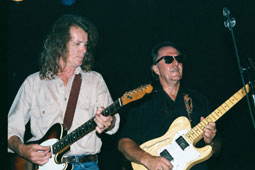
Ray: What were some of the songs you wrote or co-wrote during the Lamont years, wasn't Upper Mississippi Shakedown (writing with Pat Hayes) one of them?
Bruce: I'll just list the ones that people liked the best: 'Upper Mississippi Shakedown,' I wrote with Pat Hayes. They used to play that one at North Star games when they scored a goal. I wrote 'Lost in the Shuffle,' 'Seven,' 'Moonlight on the Broken Glass,' 'There Oughtta Be a Law,' 'The Darker Side' and others.
Ray: Do you prefer song writing collaboration or writing by yourself?
Bruce: I prefer writing by myself but I try it the other way off and on.
Ray: Any plans to do more writing with Pay Hayes?
Bruce: There are no real plans but hopefully we will sometime.
Ray: Wasn't there a Lamont album from the RCA days called "House Of Mirrors' that has never been released? Please comment on that album/recording.
Bruce: That record broke the band up. Some bad decisions were made, the choice of producer probably one of them. It took a long time to make and by the time it was done everyone at RCA that knew who we were had left in some company shake up. I was very happy that some of those songs never saw the light of day. There were lots of lessons that got learned the hard way. We'll save that for the VH1 Behind the Music show.
Ray: There was a song from the Lamont days called "I'm So Shy." Tell me about that song?
Bruce: Somebody had written an article about us and said something about a song of mine called "I'm So Shy.' I had not written a song called that. They were teasing me. So I wrote one as a joke just to confuse things in case anyone asked me about it. That took about 17 years .
Ray: Who are some of the other people you have and are writing with? Don't you also have some association with songwriters/publishers in Nashville?
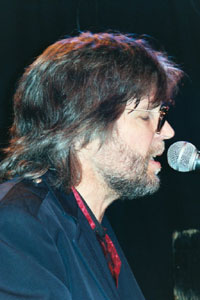
Bruce: I've written with some Nashville guys and with Paul Diethelm, David Z, Jonny, Pat, my son Mike, Charlie Bingham, Kevin Bowe, a new guy in town, Shane Henry, and a couple others.
Ray: What led to your decision to leave Lamont and form your own band? That was the Bingham-McCabe Band with Doug Maynard on vocals wasn't it? Tell me about that time and any good stories you can relate.
Bruce: The Cranstons had broken up and finished the world's longest farewell tour in order to pay off some debts. Me and Rick O'Dell went down to the unemployment line to see if we could collect that since we'd been paying in for years. The system didn't quite fit a couple guys looking for bands to join. I got some musicians to play with me at a steak house for a while but it was embarrassing, screaming while people were trying to eat dinner. I remember I wouldn't tell Charlie where it was. Then we started the Bingham McCabe Band. There were some great times and getting to work with Doug Maynard and all those great musicians was fun but the clubs kept billing us as ' formerly Lamont Cranston' (no amount of begging could get them to stop) and we just couldn't get it going financially so it folded. Charlie and I made a record during that time that never got released. That all led to the Hoopsnakes which took a while to get going but ended up working. They say you learn more from your mistakes than your successes. I consider the time just after the Cranstons was when I learned the most in all the years I've played music. I made every mistake you could make. But even at the steak house I had a great bass player John Peterson, who now plays with G.B. Leighton. I remember running out of songs and he'd pull out some cool Buddy Holly song and take over.
Ray: Was this your first time running a band and what was that like?
Bruce: I didn't run the Bingham McCabe Band. It was a group effort. Even the Hoopsnakes was pretty much a group effort. I ran certain things just because I was the singer, like the song list, and I ended up making the day to day decisions just because it was easier than calling everybody. Anything serious was voted on.
Ray: Was the music scene much different when you started playing compared to today? Any favorite clubs?
Bruce: The bar scene when I got here was different in many ways. The Cabooze was just starting up. We played the Cabooze, The Union Bar, The Tempo, The River Serpent, and other places. I think the biggest difference was that it was just more socially acceptable to drink a lot. The beer was cheap and the drunk driving laws weren't enforced as strictly. It led to rowdy crowds and a kind of wild west atmosphere that is gone. I have to say that it's probably a good thing in the end, much safer. The insurance the bars had to pay went up, drink prices went up, and it was harder to get big crowds at the bars. To be honest I sometimes miss the craziness of those days.
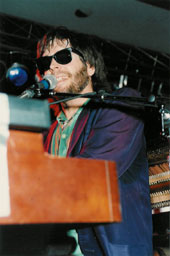
Ray: Tell me how the Hoopsnakes came about, and who the members were? And where the name came from?
Bruce: The Bingham McCabe Band or 'Bring 'em a Cane Band' ( we were already thinking we might be too old for this) broke up and I was lost for a while. A guy from the Five Corners called and said they were thinking of starting music there. I was going to try a solo thing but immediately chickened out and put a band together, Charlie, Jim Novak, and Bill Black on bass. They had a really nice piano there which was part of the incentive and being flat broke with a wife and two little boys was the other. I had to get another bass player once we started traveling so we hired Steve York. Steve later became our manager-booking agent and Mick Massof was our new bass player.
Ray: Any good Hoopsnakes stories you can relate? They were a very popular band in the Twin Cities during those years and continue to have a big following.
Bruce: The early days at the Five Corners are some of my favorite times when I think back. I was so scared being the front man at first but the band really clicked and after a while our every Wednesday night deal turned into a gathering of friends that came every week and it was great fun. I really liked the people that ran the place back then. Cody Anderson was our sound man. I always liked working with him. He was the first guy to get the piano sound I liked. When we branched out and started playing other clubs Gene Wenger was our booking agent. Suddenly things started looking up. We got enough money together to make our first album which helped things along. The second album we got Garry Tallent from the E Street band as producer and made it out in Long Branch, New Jersey. It was called 'Jump in and Hang On.' Garry is still a friend and we stay in touch. When it was ready Charlie and I drove around to all the radio stations in town that might play it. The response was very discouraging until we got to Cities 97. They were great. They played 'Still Rainin' on regular rotation and even had some billboards around town that said 'Jump in and Hang On' -The Hoopsnakes- The music is the message. When I first saw that I had to pull the car over and just stare at it. Those are great moments.
Ray: You were also a part of many of the early Bayfront Blues Festivals (any interesting stories?), how do you like playing the larger fests vs. the clubs?
Bruce: We had played all the Bayfront Blues Festivals at one point. The only band that was tied with us was my favorite singer Big Walter Smith. He won that race. I think he's done them all. After the Hoops had broken up we did a reunion show there. Charlie couldn't make it so his brother Bob took his place. Lonnie Knight and David Eiland were there. It was toward the end of the festival and I thought a lot of people had left, but before we went on people started coming out of nowhere with Hoopsnake t-shirts on. For the encore Big Walter came up and sang and Jonny Lang got up and played guitar. That might have been my favorite show ever. There was such a good feeling to the whole thing. I like playing anywhere but rockin' out in sweaty little clubs is how I got started and it still is fun.
Ray: That band went through some personnel changes over the years, why did Charlie leave?
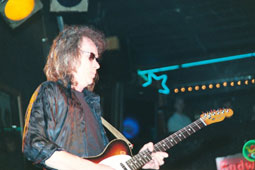
Bruce: Charlie got frustrated. We'd been playing for almost ten years and we were in a holding pattern with disagreements as to how to get to the next step. I didn't blame him for leaving. We had a manager at the time who had a problem with telling the truth. We fired him shortly after Charlie left. The guy who took over selling our records we're still having trouble with. That's all I'll say about that. We went on with Lonnie Knight and David Eiland joining the band. They were great but it was a bit like starting over. We lost some old fans but were getting some new ones. Who knows where it might have ended but when I was asked to join Jonny's band it seemed like I should. I've never missed fronting a band. I'm pretty sure I'm more naturally suited at being a side man.
Ray: How did you first meet Jonny Lang?
Bruce: Jonny had just come to Minneapolis and opened up for the Hoopsnakes at Gabe's. The crowd was going crazy over him (something I've witnessed many times since) and I was nervous about the Hoopsnakes going on after him but I was listening just as amazed as everyone else. I closed my eyes and asked myself if I would like it if I didn't know he was fourteen. The answer was yes. With my eyes closed it could have been Ted Larson playing a lot of it. Jonny got up and played with us and I was amazed all over again. I called David Z, who I had known since I first came to town (his very first record he ever produced was an Aces, Straights and Shuffles record that never came out) when I got home and told him what I had seen in case he was interested. It turns out Kevin Bowe had called him earlier with a similar story.
Ray: What made your decision to leave the Hoopsnakes and join, first the Big Bang and then Jonny Lang?
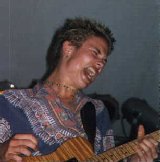
Bruce: Jonny's dad, Big Jon, asked if I'd go down to Memphis where they were going to record a demo to shop to record companies. David Z had gotten a hold of them and was going to produce it. I agreed. Things went well and on the way home Big Jon asked if I'd like to join the Big Bang. I asked for some time to think about it but on the way back Jonny was singing my favorite Sam Cooke song, 'You Send Me' and if you ever hear him sing quietly like that you'd know that he has one of the most amazing voices ever. Add to that his ability on guitar, his looks and his personality and it's not too surprising that he got some attention. He's very intelligent and very kind. He has never had the ego problems that would almost come naturally with what's happened since he was very young. It's been a great thing to be a part of, a very positive experience.
Ray: You've been touring with Jonny for the past several years, what has that been like? Any good stories to relate?
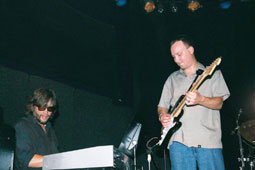
Bruce: The Jonny Lang Band has been one great experience after another. It was a rough beginning watching the Big Bang get replaced. I really liked those guys. I won't go into the story but there are very few people I respect as much as Ted Larson. He's a great person and a great guitar player. We did a lot of traveling in vans those first couple years. It would have felt like starting over in the business but it always felt like it was on the way up. I've rarely seen a crowd that wasn't completely taken with Jonny. We've been on the Tonight Show a couple times, David Letterman, Conan and others. We've been to Europe a few times, been on tour with B.B. King, Aerosmith, The Rolling Stones and others. I've been in the studio recording songs I wrote in my kitchen with the great Steve Cropper sitting next to me playing guitar. This is the kind of stuff you dream about when you're a kid but you never really believe it could happen. I am very thankful.
Ray: Tell me about Jonny's band (and about Doug Nelson).
Bruce: It's a great bunch of people. Paul Diethelm, Billy Thommes, David Eiland and now Billy Franze. That's just the band. Then there's Gerry Stinson, the sound man and a good friend, Tim Fitch, Mike Ronkinen, Lynda Davis, Trevor Ibach and Greg Classen our road manager. They're all good at what they do and are fun to be around. I'm extremely aware that it's rock and roll and things can change very quickly. If I get replaced for any reason I'll always consider it as a very cool thing to have been a part of.
The phone rang one morning and it was Billy calling to tell me Doug had been hit by a truck and killed. It was such a shock. That was over a year ago now and I'm still not over it. I think about him often. We were a couple of old guys asked into a situation that generally belongs to younger men. The band has people of such different ages. When Doug did his Pa Kettle impersonation I guarantee I was the only one who knew what he was doing. He was only a year younger than me and had been a musician his whole life so we had been through a lot of the same things. All the memories of all the kind things he did flooded back when he was no longer around. I feel like I'll see him again someday. He's just around the corner.
Ray: Has touring with Jonny been any different than some of your previous major road tours?
Bruce: The hotels, the food, the venues, it all just keeps getting better.
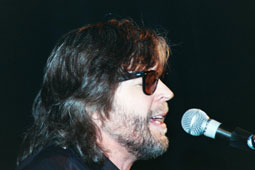
Ray: Tell me about your song writing and recording credits (both on other's albums and your own). I know there have been many over the years, please touch on the highlights or give me a complete listing if you would like.
Bruce: I'd rather not list them all if that's ok. I've got songs on Cranston records, Hoopsnake records and Jonny records. Shannon Curfman did a couple. Joe Cocker put ' Lie to Me' on his last one. I'm very proud to have gotten to play on a Luther Allison record and Bernard Allison 's got a great record coming out that I played on. That was a lot of fun. The records I made with R.J. Mischo and the songs I played on with Joe T. Cook are among my favorites. It's gotten to be a fairly long list with the passing of time. I got the most mileage out of playing on one Big Head Todd and the Monsters song, 'Broken Hearted Savior' where you can barely hear the piano at all.
[Editor's note: below is a partial listing of some of the recordings Bruce has been on.]
Luther Allison, Blue Streak (1995) Piano
Ole Ask, Ask (1998) Piano
Ole Ask, Turning Point (1999) Piano
Peter Blakeley, Pale Horse (1994)
Bone Shakers, Think About You (1996) Piano
Kevin Bowe & The Okemah Prophets, Restoration (2000) Piano
Shannon Curfman, Loud Guitars Big Suspicions (1999) Piano
Hoopsnakes, Live Snakes (1993) Keyboards, Vocals
Hoopsnakes, Hoopsnakes (1993) Keyboards, Vocals
Hoopsnakes, Jump in & Hang On (1994) Keyboards, Vocals
Hoopsnakes, Ten the Hard Way (1995) Keyboards, Vocals
Jack Knife and the Sharps, Jack Knife and the Sharps (1994) Piano
Lamont Cranston Band, El Cee Notes (1978) Organ, Piano, Keyboards, Vocals
Lamont Cranston Band, Up from the Alley (1980) Piano, Keyboards, Vocals
Lamont Cranston Band, Shakedown (1981) Keyboards, Vocals
Lamont Cranston Band, Roll with Me (1997) Keyboards
Jonny Lang Lie to Me (1997) Piano, Vocals (bckgr), Clavinet
G.B. Leighton, Come Alive (1996) Piano
R.J. Mischo & Teddy Morgan, Ready to Go (1997) Piano
Molly & the Heymakers, Big Things (1995) Piano
James Solberg Band, See That My Grave is Kept Clean (1995) Piano
Various Artists, Very Special Christmas, Vol. 3 (1997) Keyboards
Various Artists, Blues from the Twin Cities (1998) Piano
Jonny Lang, Wander This World (1998)
Various Artists, Home of the Blues [MCA] (1999) Wurlitzer
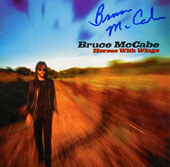
Ray: As I am writing these questions I am listening to an often overlooked but excellent album called 'Horses With Wings' (circa 1996). Was this your first solo album? Tell me about it (the songs, players, recording, etc.).
Bruce: Yes, that was my first. I'm still really proud of that record. It's a testament to Mick Massof's good 'ears.' You can have the most expensive equipment in the world and still make a lousy sounding record. Mick recorded that on an eight track cassette recorder and I think it sounds great. We did it piece by piece. I played a lot of guitar on it. I'd watch guitar players take twenty takes on a solo and always thought I could play a good solo if I had twenty tries. I had some friends help out, Rick Hollister, Rick O'Dell, Larry McCabe, Ron McCabe, Mike McCabe, Brian Leighton, Charlie and Mick, and Steve Smith on drums. We learned a lot and the atmosphere of sitting around with a good friend like Mick and experimenting with sounds led to some songs I still like listening to.
Ray: Several years ago behind the tent set up in Dinkytown prior to your first major tour with Jonny I stopped down with two of my kids and had you autograph that CD. You commented with a laugh that I must have been one of the two people who bought it. Is that CD still available?
Bruce: Yes. Go to: www.ryancoryrecords.com and my son Danny will be happy to take your order for that one or the new one.
Ray: There are some excellent songs (not all blues) on that album. Do you write in any particular style or genre?
Bruce: I write all kinds of things. I'm all over the map. Lately I've been writing stuff that sounds like something Tony Bennet or Nat King Cole would do. I don't know where they come from and I don't question it. I just take dictation when they pop into my head and work on them til they seem finished.
Ray: 'Rack 'Em Up' (a song on that album) was also later recorded on one of Jonny's albums, tell me how that came about and what goes into the song selection on an album.
Bruce: That CD was put out right about the time I joined Jonny's band. I must have given him a copy. The songs are picked by the artist and the producer.
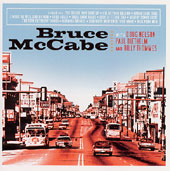
Ray: You recently released your second (right?) solo CD, called 'Bruce McCabe.' Tell me what led up to that recording, the songs and who played on it, who distributes, where people can find it, etc.
Bruce: I'm excited about this record. I hope somebody buys it. It's a culmination of a lot of things. I learned a lot watching David Z in action over the years. I pick the key I sing in more carefully than I used to. I go for spontaneous things as opposed to perfection in a lot of areas. I'm getting a better idea of what I'm after.
It started as a demo to get more songs to Jonny but as usual I got carried away. A lot of the songs are first takes. The first three songs are what we recorded on the first day. I left them pretty much alone other than adding solos. 'Dream Come True' I went for spontaneity to the point of not telling them the chords or playing the song for them at all. They had to get the chord changes from hand signals. Obviously you have to have really sharp musicians to pull that off. I'm pretty sure that's take one and I didn't add a thing. 'Rich Poor Man' was almost as quick. I had no idea these guys had ever listened to any rockabilly. I handed them chord charts and I handed Paul my Gretch Country Club guitar and what you hear is the first time we played it. The guitar solo is so cool on that one I'd put it up against Cliff Gallop, the guy who played for Gene Vincent . Doug taught me about not having echo on the harmony vocal that I added. I had so much fun on that song it was all I could do to keep from laughing. 'Irish Angel' was recorded with most of us in the same room so you can't really do overdubs and we had to keep starting over because there was construction going on outside and this jackhammer kept ruining every take. We finally got through one and I'm glad we did. It was one of Doug's favorites.
There were lots of magic moments during the recording. Jason Orris is without a doubt my favorite engineer I ever worked with. Being a great writer, musician himself, I got to trusting his opinion over my own. I highly recommend Terrarium as a studio, Jason as an engineer, Paul as a guitar player and Billy as a drummer. Paul and Billy are versatile in so many styles, way beyond what I do. If you're making a recording give them a call.
You can get it at www.ryancoryrecords.com, Best Buy, The Electric Fetus, or Musicland. It's being distributed by Oarfin.
Ray: You had a CD release party for that album at Bunker's'fun night for you? Didn't your cousin also join in on a song or two as well as your son Mike? Tell me about that night.
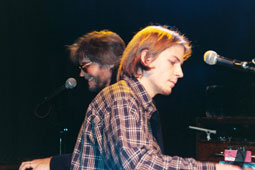
Bruce: I had a great band that night. Billy Thommes on drums, Jim Anton on bass, Paul Diethelm and Charlie Bingham on guitars. Larry McCabe and David Eiland played on a few and my son Mike played piano on a song we wrote together. That was a big moment for me. It was a lot of songs to learn for just one night so we might do some more shows.
Ray: Do you have other children and are they all musically inclined like you? What instruments, etc.
Bruce: I have two sons. Danny, 23, graduated from St. Thomas. He got married last summer. He's busy as a real estate agent. If you are looking to buy a house call Dan McCabe at 612-728-8793 . I can personally guarantee an honest, hard working guy. I'm a little biased but I'm having him run our record company on the side and he's doing just fine. He's got a head for business which he got from his mother. I'm proud of him on all levels. I'm also very proud of Mike. He's very into classical music. He keeps turning me on to great music by people I never would have known about, like Shostakovich, Barber and Prokoviev. He's going to MCTC and doing well. I could go on and on about the both of them. It's often occurred to me that by not being in bands that were on the road a lot I got to be with my boys when they were young. We spent a lot of time playing baseball at the park. It's funny how things worked out. I missed a lot of Mike's high school years but he turned out fine and now I can afford to send him to college.
Ray: What are you musical plans for the near future (this next year)?
Bruce: They keep postponing the release of Jonny Lang's new record so I'm up in the air as to how much time I have to mess with. I'd like to do more shows with the band I had at Bunker's and I want to get back into Terrarium. I have a lot of new songs I want to record.
Ray: What music do you listen to today? Who are some of your favorite musicians that you like to listen too and is there any new talent that you have seen/heard?
Bruce: Like I said before, my musical taste is all over the map so I'll just list what I've been listening to recently- Aretha Franklin's 'Amazing Grace' album, 'Willy Deville Live' ('And Heaven Stood Still' over and over again) Bob Dylan's 'Love and Theft,' Nat King Cole Trio - live in some little club, 'Chicago/ The Blues Today,' The Kinks 'Muswell Hillbillies,' and Flipp's 'Blow It Out Your Ass' (what an album title, I love that record).
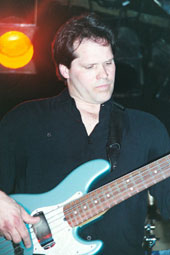
Ray: You will have had several Hoopsnakes reunion shows by the time this interview is completed. Tell me what led to those reunion shows and how they went?
Bruce: These guys are my oldest friends and we're seeing whether we can still do it. So far so good. [Editor's note: Both Hoopsnake's reunion shows, at Gabe's and The Cabooze, were sold out shows, drawing some of the largest crowds for a local blues band in quite a while.]
Ray: Any plans for more shows in the future or a reforming of the Hoopsnakes?
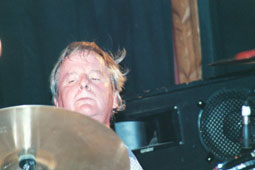
Bruce: There are no real plans. We're just doing what seems like the most fun. I guess that always was the plan.
Ray: Where do you see your personal music heading over the next few years?
Bruce: Wherever it takes me. Finally , a short answer.
Ray: Do you still plan on touring with Jonny? If so, how does that fit into your longer range musical plans?
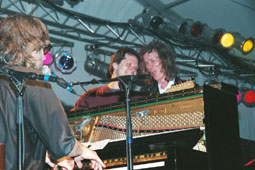
Bruce: I really enjoy touring with Jonny so I have no reason not to as long as I keep getting asked. That fits right into my long range plans to keep playing music and having fun with it.
Ray: I know this has gotten to a lot longer than I originally planned. I really appreciate you taking the time to do this interview.
Bruce: I don't often spend much time going down memory lane like this, so this was fun. I hope I didn't bore your readers too much and I apologize to all the people I didn't get around to naming. There were quite a few stories I could have told and I admit to leaving out some I wish I could forget.
 Simply click on the CD cover at left to order this CD NOW!
Simply click on the CD cover at left to order this CD NOW!
This Interview is copyright ' 2002 by Ray Stiles, and Blues On Stage at: www.mnblues.com, all rights reserved. Copy, duplication or download prohibited without written permission.
For permission to use this review please email Ray Stiles at: mnblues@aol.com

 Web Hosting & Design:
Web Hosting & Design:
Web Hosting & Design.
Most affordable web hosting and design services available.
Find out how you can host your current site at Blues On Stage, or how I can help you design your own website!
 If you would like your CD reviewed, please send TWO (2) copies, along with promotional material to:
If you would like your CD reviewed, please send TWO (2) copies, along with promotional material to:
Blues On Stage
PO Box 582983
Minneapolis, MN 55458-2983
E-mail Ray Stiles @ mnblues@aol.com with any questions.
